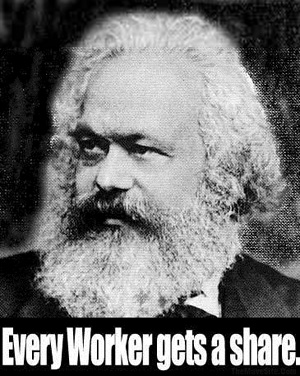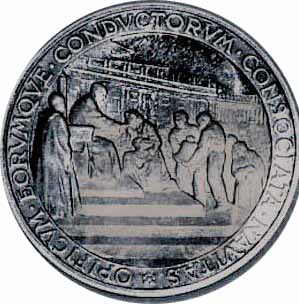 |
Socio-Political Issues
Distributism Is Not Catholic
Dr. Carol Byrne
The defining characteristic of Distributists is the underlying belief that they are the Ones Who Know Best. This assumption underpins everything that Distributism stands for and everything Distributists accept or reject. They tell us, among other things, that we must flee the cities and go back to the land, work only from home, oppose the expansion of the financial sector, industry and technology, patronize the corner shop rather than the supermarket, not eat white bread or put chemical fertilizers on our crops, and above all never work for an employer or take out a mortgage to buy a home. What, it is pertinent to ask, entitles such people to supersede our own decision-making abilities and micromanage our living arrangements for us? And on what authority do they issue such momentous pronouncements?
Distributists would like us to believe that they speak in the name of the Church, claiming that their ideas are rooted in the Papal Encyclicals and in Catholic Social Teaching. But it can easily be shown that their ideas have simply been taken from the Marxist stockpot, having first been mediated by the early 20th-century Catholic Distributists – in particular Hilaire Belloc, G.K. Chesterton and Eric Gill – who saw the world through Socialist-tinted lenses.

Marx's thinking underlies Distributist principles
|
So how did these Distributist ideas come to be adopted and spread by Catholics? This is the central, most crucial question, for on its answer hangs the validity of the claim that Distributism is a system which Catholics could and should accept as a morally correct system.
It was Karl Marx, not the Popes, who taught that Capitalism can flourish only by means of social injustices, that the contract of hiring workers reduces them to “wage-slaves,” that it is in the nature of big business to concentrate wealth in the hands of the few and pauperize the masses, and that all transactions made by capitalists are driven solely by greed for profit. This is simply the Red flag flying, yet one finds these Marxist slogans being uttered by Catholics (including priests) as if they were invested with biblical inerrancy. Unfortunately, they bring the Church into disrepute by giving the false impression that Catholic Social Teaching encourages resentment toward the rich and condones attempts to deprive them of their possessions.
Underpinning the ideology of Distributism is the idea of “wage slavery”, a term used by Marx to indicate the relationship between what he, in opposition to the Church, saw as two warring factions – capital and labor, the bourgeoisie and the working class, the owners or managers of the means of production and the employees who sell their labour for a wage. The object of Belloc’s vision was to free people from the employer’s dependence, which he termed “wage slavery.” Distributists share this central aspect of Marx’s economic philosophy and call for the elimination of the employer-worker relationship so that workers can reap the full benefit of their work without giving any profits to employers.
Indeed, Distributists go much further and say that there is no place in a just society for capitalist enterprises and that Catholics should have nothing to do with them. They are overwhelmingly persuaded that the traditional Catholic emphasis on the free market harms society. Belloc claimed:
"It is a necessary inference that there will be under Capitalism a conscious, direct, and planned exploitation of the majority (the free citizens who do not own) by the minority who are owners... If you left men completely free under a capitalist system, there would be so heavy a mortality from starvation as would dry up the sources of labor in a very short time.” (1)

A medal commemorating Pius XII's meeting with workers
|
There is an abundance of historical evidence that the capitalist system based on the market process has proved superior to many others in raising the living standards of the masses. It is understandable that Distributists do not like free markets because they are a successful refutation of the economic arrangement planned by their leaders.
Distributists pose as defenders of private property and aim to produce a “society of owners” but only by making the rich poor and redistributing their property. The program of the 1934 Distributist League mentioned “redistribution of property” as a policy. “Property” is more than a collection of physical objects such as a house, its contents or a piece of land. There is also the ownership a person has over his intellectual or artistic works, considered property, which give him rights over non-material goods. There is the moral right/property that the father has over his family and his children until they reach majority age. There is also the right/property a businessman has over a non-material part of an enterprise, represented by a certain number of stocks. So one can say that what the property owner in fact possesses is fundamentally the bundle of rights which he is entitled to exert over what is legally his, be it physical, intellectual or moral goods.
With respect to property, Pope Leo XIII taught: “Rights must be religiously respected wherever they exist, and it is the duty of the public authority to prevent and to punish injury, and to protect every one in the possession of his own.” (2)
Distributist policies to restrict the operation of large-scale enterprises that generate wealth are manifestly contrary to justice and destructive of economic well-being. In a Distributist regime, not only would a businessman be denied the right to exercise the prerogatives of his property rights over his own goods, but a third party – whether another businessman or a private citizen – would be prevented from freely entering into a contract with him. In other words, under Distributism neither would be allowed to pursue those actions of free enterprise which constitute the real factors of capitalist production and expansion without infringing government regulations.

Workers takeover a farm in Brazil to "redistribute property"
|
One example of Distributist coercive power would be directed against rich landowners to break up their estates for small-scale cultivation by non-owners. (This, incidentally, was Lenin’s solution to the Agrarian Problem.) Chesterton proposed in The Outline of Sanity that this should be done by the imposition of a massive land tax burden, which is tantamount to institutional theft. He also proposed a tax on contracts to prevent the purchase of property by rich proprietors, which is a way of making big businessmen pay for their own demise and fund the destruction of their achievements.
In such a society there would be strictly speaking no property rights, for private ownership without exclusive control by the legal owner is a contradiction in terms. It follows that all property rights would become worthless if some administrative body holds pre-emptive power over private ownership.
Two very different models of society are contrasted here. While it is compatible with Christian freedom to use one’s personal judgment as to the value of labor and the marketable goods and services produced by labor and capital, Distributists advocate deliberate control by political authorities over economic affairs. The programme of this interventionism is supposed to make people free. But the liberty its supporters advocate is liberty to do the “right” things, i.e. the things that their leaders want to be done.
In order to fund their project, taxation would be high to give their leaders the money to plan everything for everyone, and laws would be passed to force the population into behaving in the way their heads dictate. It follows that State control is necessary to achieve this outcome for the whole of society. This is a recipe for totalitarian Socialism. We can be sure that the Distributist caudillos would be utterly ruthless in their efforts to enforce it. It would not be open to any citizen to oppose their schemes.
Why should we look to men like Belloc or Chesterton (who represent no one but themselves) as the Ones Who Know Best for guidance and support when they displayed little respect for private property? They were, of course, Catholics, but they had no room for practical economics that could work in the real world and upon which the lives of millions of people depend. They held out the promise of “security” in exchange for market freedom. As experience has demonstrated, the bargain is tempting but never pays off. We would end up losing both our freedom and our security. Even Belloc realized later in life that what he had been advocating was all a fantasy and impossible to enact in real life.
Distributism is based on the most arrogant of assumptions: the belief that there are those who have the right to dictate the rules of moral behavior on the basis of nothing more than their own prejudices.
1. Hilaire Belloc, The Servile State [1913], Indianapolis: Liberty Classics, 1977, pp. 108, 114.
2. Leo XIII, Rerum novarum n. 37.

Posted March 22, 2011

Related Topics of Interest
 The Catholic Worker Movement: A Critical Analysis The Catholic Worker Movement: A Critical Analysis
 Evaluating the Distributist League Evaluating the Distributist League
 Evangelical Poverty Is Not a Virtue for All Evangelical Poverty Is Not a Virtue for All
 St. Thomas against Distributism St. Thomas against Distributism
 Belloc's Support of the French Revolution Belloc's Support of the French Revolution
 Belloc's Enthusiasm for Rousseau Belloc's Enthusiasm for Rousseau
 Distributists Misleading Their Audience about Capitalism Distributists Misleading Their Audience about Capitalism
 A Distributist Manifesto Spiced with Communism A Distributist Manifesto Spiced with Communism
 Eric Gill, a Precursor of Vatican II Eric Gill, a Precursor of Vatican II
 Eric Gill: the Pedophile Founder of Distributism Eric Gill: the Pedophile Founder of Distributism

Related Works of Interest
|
|
Social-Political | Hot Topics | Home | Books | CDs | Search | Contact Us | Donate

© 2002- Tradition in Action, Inc. All Rights
Reserved
|
 |
|